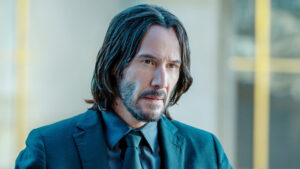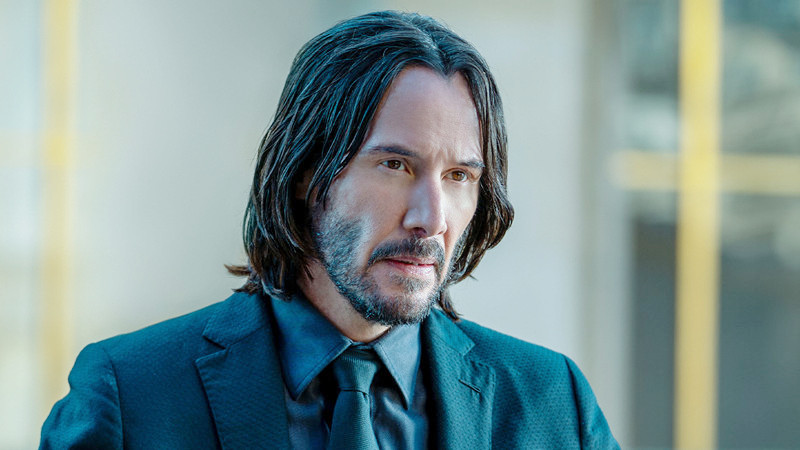What is Keanu Reeves’ Acting Style?
Exploring the mysterious presence, minimalism, and inner depth behind Keanu Reeves’ performances
(By Carmichael Phillip)

A Man of Few Words, Many Layers
Keanu Reeves has long captivated audiences not through flashy, theatrical flourishes, but through a subdued, restrained energy that speaks volumes in silence. His acting style is often described as minimalist, enigmatic, and deeply internal. Reeves doesn’t overwhelm scenes with excess emotion. Instead, he embodies a quiet intensity that invites viewers to project meaning onto his characters.
Director Chad Stahelski, who worked with Reeves on the John Wick franchise, summarized this beautifully:
“Keanu is a physical storyteller. He doesn’t need dialogue to express what his character is feeling. His body language does the talking.”
This subtlety has led to debates over the years. Critics sometimes accused him of being too wooden or emotionless, but others see a deliberate and effective use of restraint. His performances, from The Matrix to John Wick, rely heavily on nuance and emotional control.
The Art of Minimalism in Motion
Reeves’ minimalism goes beyond just the delivery of lines—it extends into the movement and composition of his roles. Whether playing a brooding hacker or a grieving assassin, Reeves has a knack for pacing himself to create space for audience interpretation.
In The Matrix, his portrayal of Neo is famously sparse. Lines are delivered with calm assurance. Eyes dart with curiosity and slight confusion. Yet he perfectly captures the transformation of a man from disbelief to ultimate self-realization.
As critic Owen Gleiberman once wrote:
“Keanu Reeves lets the world move around him. He reacts with an elegant slowness, an almost Buddhist patience.”
This calculated stillness became his signature. It draws viewers in rather than forcing emotion upon them, making his characters feel more grounded and relatable—even in surreal or hyper-stylized worlds.
Physicality as Performance
Reeves is renowned for his physical dedication to roles. His performances often incorporate martial arts, gunplay, motorcycle riding, and long takes of intricate choreography. But this isn’t just about spectacle—it’s about authenticity.
He spent months training in judo, jiu-jitsu, and gun-fu for John Wick, doing nearly 90% of his own stunts. In doing so, he integrates body and soul into the role, embodying the action rather than faking it.
“I want to feel it. I want it to be real,” Reeves said in an interview about his work on John Wick 3. “The physical part of acting is just as emotional as the dialogue for me.”
His use of physicality—measured, graceful, but potent—creates an immersive experience that compensates for his sparse verbal delivery. He lets action reveal what words do not.
The Stoic Hero Archetype
Many of Reeves’ most iconic characters—Neo, John Wick, Johnny Utah, and even Theodore Logan—share a stoic detachment from the world around them. They are men in search of meaning, often alienated and burdened with loss, yet capable of profound action.
This aligns with the archetype of the “quiet hero,” reminiscent of Western gunslingers or samurai. It’s not accidental. Reeves studied and admired Japanese cinema, particularly the work of Akira Kurosawa and Toshiro Mifune. These influences are evident in his poised stances and solemn glares.
Film analyst Susan Napier once noted:
“Keanu embodies a modern ronin—rootless, wandering, yet deeply principled.”
This archetype plays especially well in action-thrillers, where silence and presence can be more powerful than grand speeches. The less Reeves says, the more mythic his characters become.
The Voice: A Tool of Ambiguity
Reeves’ vocal delivery is often calm, slightly breathy, and paced with hesitation. Some interpret this as wooden or detached, but others recognize a consistent tonal control designed to communicate emotional ambiguity.
In A Scanner Darkly, a performance reliant on voice acting due to its animated format, Reeves manages to convey paranoia, confusion, and quiet pain—largely through subtle shifts in vocal inflection.
“Keanu doesn’t just say the lines—he listens while he speaks,” noted director Richard Linklater. “It gives his voice a searching quality, like he’s discovering the truth along with the audience.”
That sense of discovery and internal questioning contributes to the relatability of his characters. They feel real not because they’re verbose, but because they seem to wrestle with what’s unsaid.
Keanu’s Emotional Transparency
Despite his controlled delivery, Reeves does not lack emotional depth. His performances are often infused with quiet grief or longing. Rather than emotional outbursts, he allows sadness and vulnerability to seep into his characters gradually.
In The Lake House and Sweet November, his romantic leads are shy and introspective. They show love with restraint. In John Wick, the sorrow over his wife’s death and his dog’s murder is not conveyed with explosive rage but with slow-burning revenge.
“Grief isn’t always loud,” Reeves said in a rare interview. “Sometimes it’s a whisper that follows you.”
That whisper—of loss, of love, of confusion—can be felt in many of his roles. His acting style leaves room for audiences to process and reflect, inviting emotional participation rather than emotional exhibition.
Understated Humor and Charm
Though many associate Reeves with action and sci-fi, his early career highlighted his comic timing and laid-back charisma. Bill & Ted’s Excellent Adventure turned him into a cultural icon with its slack-jawed surfer slang and good-hearted goofiness.
Even in dramatic roles, Reeves injects unexpected levity. His dry humor often lands not with punchlines but with natural awkwardness. In Always Be My Maybe, his self-parody performance became a viral sensation—reminding everyone he doesn’t take himself too seriously.
“Keanu has a disarming sincerity,” said co-star Ali Wong. “Even when he’s being ridiculous, you believe him.”
This blend of charm and modesty balances his more intense roles, showcasing the versatility behind his otherwise understated approach.
Character Over Ego
One defining trait of Reeves’ acting style is his humility. He doesn’t chase awards or tailor performances for Oscar bait. He prioritizes the role, the story, and the collaborative process over his own spotlight.
He’s turned down roles that didn’t feel authentic and accepted pay cuts so studios could hire other actors (The Devil’s Advocate, The Replacements). Directors describe him as deeply respectful on set—never trying to dominate a scene unnecessarily.
“He’s the rare actor who understands the power of getting out of the way,” said Laurence Fishburne.
This absence of ego manifests in how he disappears into characters. Rather than transforming dramatically, he brings out what already exists beneath the surface of each role.
The Cult of Keanu
Reeves’ acting style has fueled a devoted fan base that goes beyond admiration. There’s a cultural fascination with him—a blend of mystery, kindness, and authenticity that transcends Hollywood norms.
In the internet age, Keanu memes and fan stories proliferate, but they all orbit around one idea: Reeves is real. That realism is what his acting projects. He doesn’t overplay, oversell, or overact.
“What you see on screen is who he is,” said co-star Sandra Bullock. “There’s no act. He’s honest in every moment.”
That honesty has become his trademark. It’s why fans embrace even his less successful films. They trust that whatever character Reeves plays, he does so with heart and sincerity.
Conclusion: Less Is More
Keanu Reeves is not a chameleon in the way that some actors morph entirely between roles. Instead, his style is consistent, grounded, and quietly powerful. He strips away the excess to focus on essence—often saying more with silence than others do with monologues.
His approach might not win him the loudest applause at award shows, but it wins something far more lasting: audience trust. People connect with Reeves because he gives them space to feel, reflect, and imagine.
As filmmaker Lana Wachowski put it:
“Keanu doesn’t act for the camera. He acts for the soul.”
In an industry that often favors volume over depth, Keanu Reeves’ acting style is a reminder that sometimes, the softest voice carries the furthest.




